Is this the end of the age of Apple?
If anything, MedMen, on Santa Monica Boulevard in West Hollywood, Calif., looks just like an Apple Store. It’s decked out with blond wood tables on which a range of products are artfully displayed — the Puffco Peak portable vaporizer, an electronic Dosist vape pen, the latest issue of Ember magazine and, of course, so much weed delivered in an astonishing variety of ways, from tinctures to gummy bears to cookies to just plain joints.
A crowd of customers is attended to by cheerful staff members decked out in jaunty red hoodies and carrying iPads. “Let’s be buds” urges a sign on one table. It certainly looks like it’s going great at this chain of weed dispensaries. But — like a lot of businesses around the newly commercialised marijuana industry in California — MedMen is struggling. The latest quarter of this publicly traded company showed a net loss of $66 million on revenues of $21.5 million.
It had lost $79 million the previous quarter. Not enough weed supply and too much expansion are among the reasons given for MedMen’s problems, but the disconnect between the company’s promise and reality made me think hard about some other terrible news this week: Apple’s announcement that it was going to miss its projected revenue by billions of dollars this quarter. Apple has hung the moon for investors for so long now that the idea of the company struggling sent the entire global stock market into a paroxysm of fear and plunging indexes.
It is, to use an old California trope, going to be a real bummer for Silicon Valley. Now stick with me here, because what’s happening across what are considered fast-forward industries like cannabis and tech is worrisome. Where is the next great boom of innovation going to come from, when even the strongest brands and products might not be sure things anymore? Apple is not only a bellwether company in tech but also the most expertly managed one under Tim Cook.
He, of course, was preceded as chief executive by Steve Jobs, who had brought the company back from the brink of bankruptcy in 1997. Since then, it has been all uphill, to the point this summer when Apple reached a $1 trillion valuation — the first publicly traded American company to reach that high — with a price of $207.39 a share. Today it’s trading at $142.64, and analysts are predicting it will settle around $135. Yipes.
Part of the problem is the meltdown of the economy in China, where Apple products are popular, and the Trump administration’s trade war. But as Ina Fried of Axios noted: “The problems Apple saw in China go far beyond just Apple. But Apple’s iPhone problems extend far beyond China, too.” Indeed. The last big innovation explosion — the proliferation of the smartphone — is clearly ending. There is no question that Apple was the center of that, with its app-centric, photo-forward and feature-laden phone that gave everyone the first platform for what was to create so many products and so much wealth.
It was the debut of the iPhone in 2007 that spurred what some in tech call a “Cambrian explosion,” a reference to the era when the first complex animals appeared. There would be no Uber and Lyft without the iPhone (and later the Android version), no Tinder, no Spotify. Now all of tech is seeking the next major platform and area of growth. Will it be virtual and augmented reality, or perhaps self-driving cars? Artificial intelligence, robotics, cryptocurrency or digital health? We are stumbling in the dark. Apple has dabbled in a lot of these areas, but it still makes its money by selling mobile phones and the accessories around them. And while I love my AirPods and lose them weekly, my forking over $159 to Apple for my sloppiness is not going to help compared with buying a cool new phone.
That business has surely levelled off, as no one upgrades quite as quickly as they did before, because of everything from the price tag and being worried about a recession to the simple fact that the new phones don’t offer that much more than the old ones. There is no question that Cook and his team have done a tremendous job taking advantage and managing this last cycle of innovation, but it’s apparent that it’s now winding down. This is a big issue not only for Apple but also for all of tech. There is not a major trend that you can grab onto right now that will carry everyone forward.
The last cool set of companies — Uber, Airbnb, Pinterest and, yes, Tinder — were created many years ago, and I cannot think of another group that is even close to as promising. Well, rental scooters. OK, they’re cool, but they are a derivative of the car rental business and are not going to make the big jumps in innovation that need to occur now. How innovation happens is a much more delicate thing than people imagine, a dance involving money, opportunity, timing, execution and, most important, one great idea behind it all. Where is that next spark that will light us all up?
Related Posts

